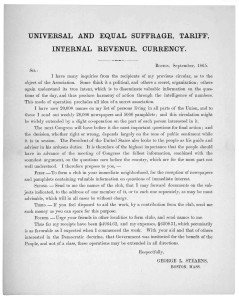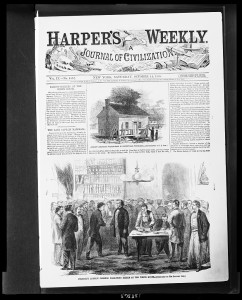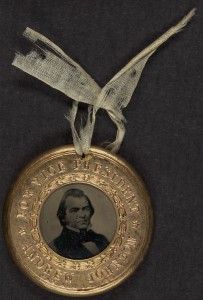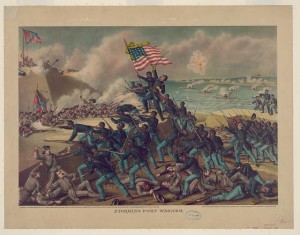From The New-York Times October 23, 1865:
IMPORTANT CONVERSATION WITH THE PRESIDENT.; Frank Expression of His Views on Reconstruction in the South He Favors a Conciliatory and Patient Policy What He Says of Negro Suffrage.
BOSTON, Saturday, Oct. 21, 1865.
To the Editor of the New-York Times:
SIR: I send the following documents for publication. They will need no comment. Yours,
GEO. L. STEARNS.
MEDFORD, Mass., Sunday, Oct. 8, 1865.
MY DEAR SIR: I was so much impressed with our conversation of last Tuesday, that I returned immediately to m[y] room and wrote down such of the points made as I could remember, and having pondered them all the way home, am to-day, more than ever convinced that, if corrected by you and returned to me for either public or private use, it will go far to produce a good understanding between you and our leading men.
It will also unite the public mind in favor of your plan, so far at least as you would carry it out without modification.
You are aware that I do not associate much with men in political life, but rather with those who, representing the advanced moral sense of the country, earnestly labor for the good of our people, without hope of, or even desire for, office or other immediate reward. The latter class desire earnestly to understand your plans, and, if possible, support your administration.
I think the publication of your process of reconstruction, with the reasons for your faith in it, will commend itself to their candid judgment, and, as I told you, inspire our whole Northern people with confidence in your administration.
The report is meagre and unsatisfactory, but I think it conveys, for the most part, the spirit of our conversation. Therefore, although the whole tenor of your words led me to believe it was not intended to be kept private, I have refrained from answering the specific inquiries; of anxious friends, whom I met on my way home, lest I might, in some way, leave a wrong impression on their minds.
Truly your friend,
GEORGE L. STEARNS.
To the President of the United States.
WASHINGTON, D.C., Oct. 3, 1865 — 11 1/2 A.M.
I have just returned from an interview with President JOHNSON, in which he talked for an hour on the process of reconstruction of rebel States. His manner was as cordial, and his conversation as free, as in 1863, when I met him daily in Nashville.
His countenance is healthy, even more so than when I first knew him.
I remarked, that the people of the North were anxious that the process of reconstruction should be thorough, and they wished to support him in the arduous work, but their ideas were confused by the conflicting reports constantly circulated, and especially by the present position of the Democratic party. It is industriously circulated in the Democratic clubs that he was going over to them. He laughingly replied, “Major, have you never known a man who for many years had differed from your views because you were in advance of him, claim them as his own when he came up to your stand-point?”
I replied, I have often. He said so have I, and went on; the Democratic party finds its old position untenable, and is coming to ours; if it has come up to our position, I am glad of it. You and I need no preparation for this conversation; we can talk freely on this subject for the thoughts are familiar to us; we can be perfectly frank with each other. He then commenced with saying that, the States are in the Union which it [is?] whole and indivisible.
Individuals tried to carry them out, but did not succeed, as a man may try to cut his throat and be prevented by the bystanders; and you cannot say he cut his throat because he tried to do it.
Individuals may commit treason and be punished, and a large number of individuals may constitute a rebellion and be punished as traitors. Some States tried to get out of the Union, and we opposed it, honestly, because we believed it to be wrong; and we have succeeded in putting down the rebellion. The power of those persons who made the attempt has been crushed, and now we want to reconstruct the State’ Governments and have the power to do it. The State institutions are prostrated, laid out on the ground, and they must be taken up and adapted to the progress of events. This cannot be done in a moment. We are making very rapid progress; so rapid I sometimes cannot realize it; it appears like a dream.
We must not be in too much of a hurry; it is better to let them reconstruct themselves than to force them to it; for if they go wrong, the power is in our hands and we can check them at any stage, to the end, and oblige them to correct their errors; we must be patient with them. I did not expect to keep out all who were excluded from the amnesty, or even a large number of them, but I intended they should sue for pardon, and so realize the enormity of the crime they had committed.
You could not have broached the subject of equal suffrage, at the North, seven years ago, and we must remember that the changes at the South have been more rapid, and they have been obliged to accept more unpalatable truth than the North has; we must give them time to digest a part, for we cannot expect such large affairs will be comprehended and digested at once. We must give them time to understand their new position.
I have nothing to conceal in these matters, and have no desire or willingness to take indirect courses to obtain what we want.
Our government is a grand and lofty structure; in searching for its foundation we find it rests on the broad basis of popular rights. The elective franchise is not a natural right, but a political right. I am opposed to giving the States too much power, and also to a great consolidation of power in the central government.
If I interfered with the vote in the rebel States, to dictate that the negro shall vote, I might do the same thing for my own purposes in Pennsylvania. Our only safety lies in allowing each State to control the right of voting by its own laws, and we have the power to control the rebel States if they go wrong. If they rebel we have the army, and can control them by it, and, if necessary by legislation also. If the General Government controls the right to vote in the States, it may establish such rules as will restrict the vote to a small number of persons, and thus create a central despotism.
My position here is different from what it would be if I was in Tennessee.
There I should try to introduce negro suffrage gradually; first those who had served in the army; those who could read and write, and perhaps a property qualification for others, say $200 or $250.
It will not do to let the negroes have universal suffrage now. It would breed a war of races.
There was a time in the Southern States when the slaves of large owners looked down upon non-slave-owners because they did not own slaves; the larger the number of slaves their masters owned, the prouder they were, and this has produced hostility between the mass of the whites and the negroes. The outrages are mostly from non-slavebolding whites against the negro, and from the negro upon the non-slaveholding whites.
The negro will vote with the late master whom he does not hate, rather than with the non-slaveholding white, whom he does hate. Universal suffrage would create another war, not against us, but a war of races.
Another thing. This Government is the freest and best on the earth, and I feel sure is destined to last; but to secure this, we must elevate and purify the ballot. I for many years contended at the South that slavery was a political weakness, but others said it was political strength; they thought we gained three-fifths representation by it; I contended that we lost two-fifths.
If we had no slaves, we should have had twelve representatives more, according to the then ratio of representation. Congress apportions representation by States, not districts, and the State apportions by districts.
Many years ago, I moved in the Legislature that the apportionment of Representatives to Congress, in Tennessee, should be by qualified voters.
The apportionment is now fixed until 1872; before that time we might change the basis of representation from population to qualified voters. North as well as South, and in due course of time, the States, without regard to color, might extend the elective franchise to all who possessed certain mental, moral, or such other qualifications, as might be determined by an enlightened public judgment.
BOSTON, Oct. 18, 1865.
Tke above report was returned to me by President JOHNSON with the following endorsement.
GEORGE L. STEARNS.
“I have read the within communication and find it substantially correct.
I have made some verbal alterations.
(Signed,) A.J.”
In The Life and Public Services of George Luther Stearns (1907) George’s son, Frank Preston Stearns, wrote that a group of abolitionists including Charles Sumner were opposed to George publishing the report of the meeting with President Johnson. However, Mr. Stearns
argued that his statement would serve as an entering wedge for negro suffrage; for which the general public was not yet altogether prepared. It would pin Andrew Johnson down to a definite policy, and in course of six months they might get something better from him. Sumner, however, did not agree to this. He foresaw that he was going to have a hard
tussle, and he considered any action that tended to make the President popular would be so much to his own disadvantage. He was not to be blamed
for this ; but at the same time it would seem that Mr. Stearns saw the situation more clearly. He published the account of his interview … (page 361)
George Luther Stearns was a member of the Secret Six, the group that funded John Brown’s raid on Harper’s Ferry. Mr. Stearns also was instrumental in raising black Civil War regiments in Massachusetts, including the 54th: “Excepting Governor Andrew, the highest praise for recruiting the Fifty-fourth belongs to George L. Stearns, who had been closely identified with the struggle in Kansas and John Brown’s projects.”

![[Andrew Johnson, half-length portrait, facing left] / A. Bogardus & Co., 872 B'way, cor. 18th St., N.Y. (New York : A. Bogardus & Co., [between 1865 and 1880]) (LOC: http://www.loc.gov/item/2004678590/)](https://www.bluegrayreview.com/wp-content/uploads/2015/10/3a32470r-183x300.jpg)



![[John Brown, 1800-1859, bust portrait, facing right in memorial frame] (1897; LOC: http://www.loc.gov/item/2005690015/)](https://www.bluegrayreview.com/wp-content/uploads/2015/10/3a53020r-235x300.jpg)
